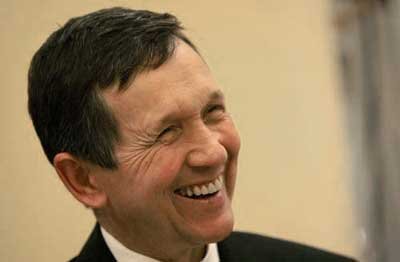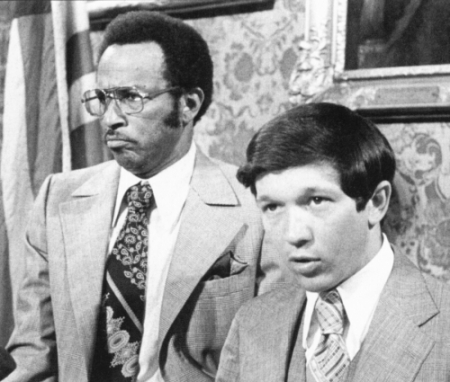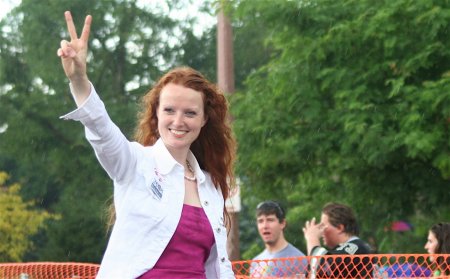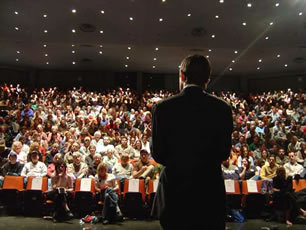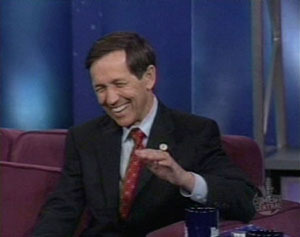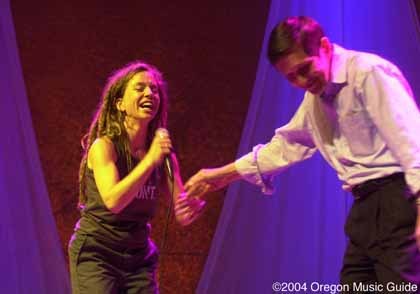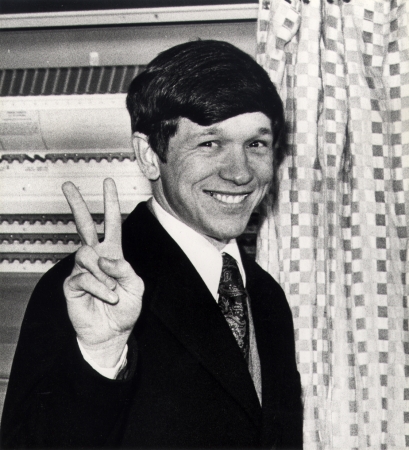Dennis Kucinich:
CLASS OF 1964
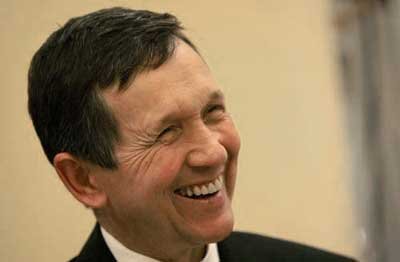
St. John Cantius SchoolClass of 1964
Cleveland, OH
Case Western Reserve UniversityClass of 1974
Cleveland, OH
Case Western Reserve UniversityClass of 1969
Cleveland, OH
Dennis's Story
Life
The oldest of seven children, Dennis was born in 1946 in Cleveland, Ohio to Frank and Virginia Kucinich. The family lived in 21 places, including a couple of cars, by the time he was 17 years-old. One of his most vivid memories was watching his family count out money on an old white counter top to see if they had enough for their bills. He attended Catholic grade and high schools.
One nun, noticing that other students were commenting on the fact that he seemed only to wear one purple pair of pants, obtained another pair for him. Such acts of kindness and compassion seared themselves into his memory and led him to a life of public service.
At 17 he left home, took jobs as an orderly and also as a copy editor while enrolling full-time at Case Western University. After graduation he began his political career serving as a councilman and later as Clerk of Courts. At 31, he ran for mayor of Cleveland attempting to become the youngest mayor of a major American city in history.
He was elected mayor of Cleveland in 1977 on the promise to save the cityÂs municipally-owned electric system which offered customers significantly lower rates than the private utility. A year later, ClevelandÂs banks demanded that he sell the cityÂs 70 year-old municipally-owned electric system to its private competitor (in which the banks had a financial interest) as a precondition of extending credit to the city.
The attempted political blackmail failed as did several assassination attempts. He remembered his parents counting out coins on the dresser and refused to sell the peopleÂs power. In an incident unprecedented in modern American politics, the Cleveland banks plunged the city into default for a mere $15 million despite being offered triple collateral to protect the loan.
The principled stand destroyed his political career. He lost his reelection bid. He was demonized as the mayor who threw Cleveland into default. Fifteen years later, the citizens of Cleveland - recognizing he had saved them hundreds of millions of dollars in municipal power bills and also forced the private utility to keep bills low to compete  voted him into the Ohio Senate. His campaign signs featured a light bulb and the expression ÂBecause he was right. In 1998 the Cleveland City Council honored Dennis for Â..having the courage and foresight to refuse to sell the cityÂs municipal electric system.Â
In 1996, Dennis unseated a two-te...Expand for more
rm Republican incumbent. He has followed that narrow victory by winning 60 to 70% of the votes in the following elections. Much of those vote totals were achieved because of outstanding constituent services and his successful efforts to save a local steel mill, two neighborhood hospitals and 10th District cities a dramatic - and disruptive - increase in train traffic.
At the same time his reputation as a progressive leader in the Congress grew. He was voted the chair of the Progressive Caucus because of his passionate commitment to peace, human rights, workers rights, economic justice and the environment.
Workplace
In 2002 the second great challenge of his elected career occurred. After analyzing the Âevidence presented by the Administration in its rush to folly in Iraq and actually reading the National Intelligence Estimate, he stepped forward to help lead 125 Democrats in voting against the blank check for the President to wage an illegal, immoral and ineffective war.
Speaking from the floor of the House some 140 times against the war and appearing on over 100 radio and talk shows was a risky political move. But it did not stop him. The neo-cons and their complicit friends in media engaged in a frenzy of caustic name calling. In Feb. of 2003 when Dennis explained on ÂMeet the Press that oil was a key causal factor for the war and that our troops would be trapped in a costly door-to-door war, administration zealot Richard Perle insisted Dennis comments were Âscurrilous and Âan out-and-out lie. Richard Cohen of the Washington Post chimed in to agree with Perle calling a Congressman who saw no evidence of WMDs and did see oil as a cause for war a Âfool. Other Âmainstream opinion commentators called him a Âclown and worse for not seeing the clear evidence of WMDs.
For his tireless and courageous efforts he was awarded the Gandhi Peace Award in 2003.
In 2006 when Israel and Hezbollah were facing off, Dennis again stepped forward for peace. As the Administration gave a green light to Israel and the Republican Congress sat silent  again  Dennis warned that the conflict and the ensuring deaths would make peace even more intractable. And now as the Israeli and Lebanese governments teeter from public criticism, his words ring true.
It was not the first nor, hopefully, will it be the last time Dennis Kucinich ignored political dangers to do the right thing. After all, it is his life story.
Register for Free to view all details!
Reunions
Register for Free to start a reunion event!
Photos
